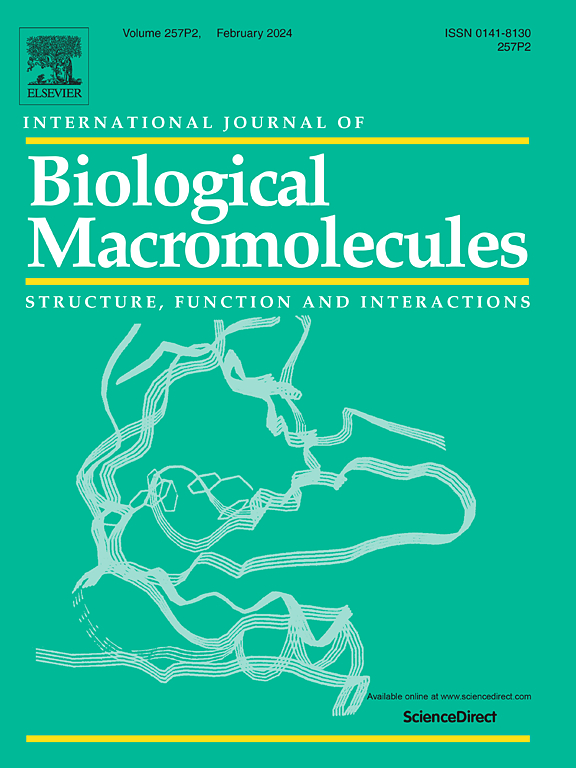PTPN2: Advances and perspectives in cancer treatment potential and inhibitor research
IF 7.7
1区 化学
Q1 BIOCHEMISTRY & MOLECULAR BIOLOGY
International Journal of Biological Macromolecules
Pub Date : 2025-05-27
DOI:10.1016/j.ijbiomac.2025.144740
引用次数: 0
Abstract
Protein tyrosine phosphatase non-receptor 2 (PTPN2) is a well-established protein tyrosine phosphatase (PTP) that counterbalances protein tyrosine kinases (PTKs) activity by dephosphorylating tyrosine residues. Accumulating evidence demonstrates that dysregulated PTPN2 expression or activity regulates cancer biology, drives immune evasion, and confers resistance to immune checkpoint blockade therapy, establishing it as a compelling therapeutic target for cancer immunotherapy. Mechanistically, PTPN2 exerts immunosuppressive effects by dephosphorylating and negatively regulating immune response signaling, thereby dampening antitumor immunity and fostering an immunosuppressive tumor microenvironment. Recent breakthroughs in PTPN2 inhibitor development, such as small molecules, natural compounds, and PROTAC degraders, have shown promising efficacy in restoring immune-mediated tumor control. However, the anti-tumor therapy targeting PTPN2 still faces challenges, including its controversial role in some tumors, potential side effects, and the lack of highly effective and selective antagonists. In this comprehensive review, we synthesize the crucial functions of PTPN2 in tumor progression and immune regulation, systematically present the latest research progress of PTPN2 inhibitors, critically analyze unresolved hurdles in drug development, and provide strategic perspectives on addressing these challenges, with the hope of accelerating the clinical translation of PTPN2-targeted therapy from bench to bedside.
PTPN2:肿瘤治疗潜力及抑制剂研究进展与展望
蛋白酪氨酸磷酸酶非受体2 (PTPN2)是一种完善的蛋白酪氨酸磷酸酶(PTP),通过去磷酸化酪氨酸残基来平衡蛋白酪氨酸激酶(PTKs)的活性。越来越多的证据表明,失调的PTPN2表达或活性调节癌症生物学,驱动免疫逃避,并赋予免疫检查点阻断治疗的抗性,使其成为癌症免疫治疗的一个引人注目的治疗靶点。机制上,PTPN2通过去磷酸化和负调控免疫应答信号发挥免疫抑制作用,从而抑制抗肿瘤免疫,形成免疫抑制的肿瘤微环境。最近在PTPN2抑制剂开发方面的突破,如小分子、天然化合物和PROTAC降解物,在恢复免疫介导的肿瘤控制方面显示出有希望的效果。然而,针对PTPN2的抗肿瘤治疗仍然面临挑战,包括其在某些肿瘤中的争议作用,潜在的副作用,以及缺乏高效和选择性的拮抗剂。在这篇综合综述中,我们综合了PTPN2在肿瘤进展和免疫调节中的关键功能,系统地介绍了PTPN2抑制剂的最新研究进展,批判性地分析了药物开发中尚未解决的障碍,并提供了应对这些挑战的战略观点,希望能够加快PTPN2靶向治疗从实验室到临床的临床转化。
本文章由计算机程序翻译,如有差异,请以英文原文为准。
求助全文
约1分钟内获得全文
求助全文
来源期刊
CiteScore
13.70
自引率
9.80%
发文量
2728
审稿时长
64 days
期刊介绍:
The International Journal of Biological Macromolecules is a well-established international journal dedicated to research on the chemical and biological aspects of natural macromolecules. Focusing on proteins, macromolecular carbohydrates, glycoproteins, proteoglycans, lignins, biological poly-acids, and nucleic acids, the journal presents the latest findings in molecular structure, properties, biological activities, interactions, modifications, and functional properties. Papers must offer new and novel insights, encompassing related model systems, structural conformational studies, theoretical developments, and analytical techniques. Each paper is required to primarily focus on at least one named biological macromolecule, reflected in the title, abstract, and text.

 求助内容:
求助内容: 应助结果提醒方式:
应助结果提醒方式:


